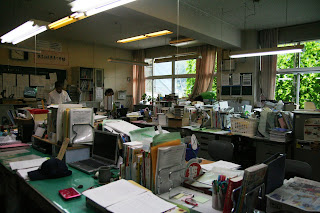Autumn came in a day.
Wednesday's hot rays of the sun turned into Thursday's cold breezes. The enveloping humidity gave way to a rainy calm. I was outside without a sweater on Thursday night and I felt...cold. That night, I knew I wouldn't need the air conditioner. I have never been subjected to such an abrupt seasonal change. The trees which line the countryside are still largely green, but the red and brown leaves are appearing one-by-one, more every day.
I will now regale you with the heart-warming and detailed tale of my typical workday.
I wake at around 6:45. I try to do good things in the morning, like stretch, eat a good breakfast, make my bed, and do my hair, though I usually only have time for three out of the four. Grabbing an umbrella as I walk out the door (because you never know,) I begin my drive to work at 7:30. My 1999 Nissan Pulsar has a toll-card-system that beeps at me: BEEEP! kaado ga sounyuu sareteimasen! (The card is not inserted!) I hear it every morning as I'm backing out of my parking space. I usually play my iPod via the tape player. The sound that comes out sounds like what comes out of a dinky cell phone, but it's so much better than nothing.
I turn left onto my tiny narrow street that only one car can fit on, onto the main street, and then onto the highway. A few minutes later and I'm on the narrow, windy, road that I take all the way to school. Mountains always on my right, the river on my left. I pass dozens of small businesses: restaurants, car repair shops, barbers, grocers. I fight to keep my eyes firmly on the road lest I be tempted into gazing through the window at the sound-of-music view of the mountains and the meadows and the rolling river. I drive parallel to both the river and the local train line. The shinkansen bullet-train track once juts incongruously through the valley. If I'm lucky, I get to catch it flying by, spending only a few seconds in the open air before it's back into another tunnel. After half an hour on the road, I turn into my school, drive a couple hundred feet down yet another way-too-narrow path, and park in a dusty gravely lot with room for about 10 cars. I turn off my iPod, step out of the car, and take in the humidity and bug sounds. My work shoes crunch the gravel and clack on the concrete. I reach the entryway, take off my work shoes (which I guess aren't work shoes after all) and put on my indoor slippers. Then I step into the teachers' room.
Ohayou gozaimasu!!!! ("Good morning!") is the first thing you must say every day. And everyone must say it back to you. Then I stamp my name-stamp on my attendance sheet. It is a small round stamp that says "Rebecca." And it means I was there that day. Then I sit at my desk. It's only about 8:00, and my work start time isn't until 8:15, but you have to get there early; you have to, or else it seems like you're not dedicated to your work. God forbid you EVER get there late. The morning music plays on the PA system; it's the same song every single day. By the end of this year I will forever and always associate this song with the morning meeting time. I organize and try to read some Japanese materials being passed around, or check on which lessons I have that day, plus a few more rounds of ohayou gozaimasu, until the morning meeting starts. The principal and VP give a few announcements, as well as any other teachers who have anything to say. I try to understand but usually understand about half at best.
This is the teachers' room. Lots of messy teacher desks, lots of conversations. We use the adjacent kitchen to prepare green tea or barley tea for ourselves.
Classes start. My JTE (Japanese Teacher of English) and I traipse up to the 2nd floor classrooms, picture cards, textbook, and pen in hand. Ms. Muto: "Okay let's start." Students stand up. A student: "Hello, Miss Muto. Hello, Rebecca." All other students echo in unison. Ms. Muto: "Hello everyone!" Me: "Hello everyone! How are you?" Students in unison: "I'm ____, thanks, and you?" Me: "I'm ____!" Every class must start this way. Then they sit down.
A classroom. Natural lighting is utilized much more than in the fluorescently-lit classrooms of the States.
Class lessons and activities are varied but usually entail me assisting Ms. Muto by pronouncing lists of words to the students, which they echo, and reading picture cards to them. Students learn grammar points by memorizing dialogues and sentences and learning direct translations. Each lesson is a unit which uses dialogues to incorporate grammar points and sometimes-random-sometimes-useful vocabulary. At times the students' lessons are counterintuitive to my own notions of what makes learning fun and interest-grabbing and I feel they aren't learning real communication at all. Although I sometimes feel aversion to the Japanese method of classroom learning, I try to remind myself that it is not "worse", just different. And you certainly can't argue with the fact that Japanese students for the most part are beyond well-behaved and respectful. The Japanese school system and cultural views are intertwined, and the longer I live here the fuller idea I have of exactly how the cultural system manifests itself in all aspects of life. However, this will be its own entry once I process it more.
Lunch is spent eating in the classrooms with the students. All food is doled out by the students themselves, wearing cute little lunch-lady outfits and masks. Three or four students on a rotating basis serve to their whole class. Once everyone has all their food (which can take long enough for it to become lukewarm,) we say "itadakimasu" ("I receive [this meal]".) I pick one class a day to eat with. Since I've decided to (mostly) speak English with them, and they (mostly) don't speak any, this usually entails awkward silence at whatever table I happen to be sitting at. But I'm told this will improve as they warm up to me more. Lunch time is also the time where I pick the strips or pieces of meat out of the school lunch and receive confused stares from all students. There is always meat but rarely is a meal so meat-based that I don't get enough to eat. The lunch time music also plays, usually 4 or 5 songs. When lunch is over, we all say together "gochisousama deshita("it was a feast.") I think these pre- and post-eating chants are beautiful and show a deep gratitude for the privilege of having enough to eat.
Since our whole school is only three classes, I usually teach three classes a day and sit in on another one, leaving at least two periods of the day free. Sometimes I perform personal duties such as budgeting, trip planning and meal planning, sometimes I study Japanese, sometimes I read my lesson-planning books, and sometimes I not-so-inconspicuously use my phone. I always check, grade and correct students' English notebooks, though that doesn't take long. Feeling underutilized and struggling through the communication barrier every day in the teachers' room is one of my biggest stressors at work. I can never be a normal member of the team. I am a special little fawn who must be told what to do. But guys, I'm not really that stupid. I'm actually quite capable and independent, just not with this massive communication barrier. You don't see the real worker-me at all. It's handicapping, but not miserable. I know my co-workers realize it too and we try our hardest to make things work. I try to help out as much as I can and work hard as much as I can, although there is only so much I can do, and my true amount of responsibility at school is small indeed. The more comfortable I get at school, the more clearly I see how I can go above and beyond my stated responsibilities so that I will actually feel like I'm accomplishing something at this school.
At 3:15 school is over and cleaning time begins. I usually forget it's happening and run upstairs in a rush to help the students clean their classrooms. I've become quite the master of the hataki or Japanese duster. Instead of feathers it uses strips of cloth. I dust the chalk-covered shelves and the items on them. I organize stacks of books and pick up tiny straw wrappers from the floor. I do not usually do the heavy cleaning the students do, such as cleaning out bathroom drains or rubbing the classroom floors with a cloth. (Even in my elementary school the first graders clean their classroom and bathroom in this way.)They play the same cleaning music every day too. Here is one of the songs.
By 3:45 most students are gone for the day. The 3rd-graders (a.k.a. 9th graders) go home, ostensibly to study, while the younger two grades stay at school and do bukatsu, or club activities. I've heard tell that some larger middle schools have clubs such as sewing club, English club, drama club, kendo club, etc. Since my school has only 52 students, we have soft tennis and basketball. And that's it. So my final hour at school is spent hearing their club chants: A giant "ganbarimasu!" ("we will try our best!") before starting their practice, continuous shouts of "nice serve!" and "nice catch!" as they practice, and a rousing "arigatou gozaimashita!" ("thank you very much!") when they finish. I'm technically able to leave at 4:00pm, but unless I need to catch a train or something, I usually stay until at least 4:15 or 4:30, so it doesn't look like I'm dying to get out of there. All JETs are told to do this. It is the Japanese style of working. As younger and newer workers, we MUST be dedicated, hardworking, and obedient. (Note that being creative or having an optimistic personality are not similarly valued.) As I'm exiting the teachers' room, I must say "O saki ni shitsurei shimasu" ("It's rude of me to leave earlier than you!")Since I do leave earlier than almost all my co-workers, I absolutely must say this every day when I leave.
In the evenings, I return to my cubicle of an apartment and do normal things such as going on the internet, cooking dinner, grocery shopping, or cleaning. Sometimes I go for a walk (not by the places where bats live though.) Some nights I eat dinner out with other Shibukawa people or travel to Takasaki by train. On Tuesdays I go to Japanese conversation practice. I think my evenings will get busier as I take on more responsibility at my school and in my community, but for now I enjoy the freedom I get from ~5-10pm most nights. Since I find myself frequently tired at work (because I am bored and not challenged enough so I naturally feel my fatigue more) I try to sleep early and get a decent amount of sleep.
Life is happening both slowly and quickly at the same time. While some workweeks seem to last forever, I cannot believe it's been nearly two months. My routine, my comfort, my baseline, is turning into this lifestyle. It's not a novel and uncomfortable experience but my new normal.



No comments:
Post a Comment